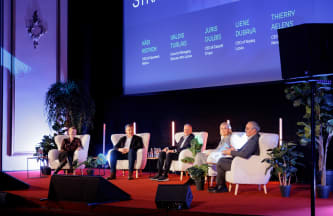
ICA is the first Nordic grocery retailer to have science-based net zero climate targets approved by the Science Based Targets initiative (SBTi). Emissions from the food sector account for 25–30 per cent of global emissions. As a major player in the food chain, ICA wants to show the way and contribute to reducing global warming in line with the Paris Agreement.
The targets mean that different types of emissions must be reduced a different rates with clear milestones to 2030 and 2050. The long-term goal is net zero. The emissions that still remain in 2050 must be balanced out by storing the corresponding amount of carbon dioxide using technology or natural approaches.
“As a major player in the food chain, we want to contribute to driving this work forward. Our customers can be confident that we have control over our climate impact throughout the value chain and can direct our efforts where they will best contribute to reducing this impact in line with what science requires. One prerequisite for our success here is that we do this in collaboration with our partners, suppliers and customers,” says Kerstin Lindvall, Chief Corporate Responsibility Officer at ICA Gruppen.
The science-based targets apply to ICA Gruppen as a whole and cover the climate impact from all companies in the Group and their value chains. ICA Gruppen already had goals in place for 2030 to both reduce emissions from its own operations and the climate impact from sold food. Additional emissions are now included and long-term goals set for 2050. Suppliers, stores and customers must reduce their emissions if ICA Gruppen is to achieve these goals.
“The science-based targets confirm that our current key indicators address the largest sources of emissions so our roadmaps to 2030 remain in place. Prioritised efforts include continuing to phase out fossil fuels, climate-adapting refrigerators and freezers, continuing to improve energy efficiency and not least accelerating efforts to reduce the carbon footprint of the food we sell,” says Kerstin Lindvall.
Starting with the annual report for 2024, ICA Gruppen will publish a complete sustainability report with all emissions in scope 1, 2 and 3. Unlike in previous years, ‘FLAG emissions’, emissions from activities in various types of land use, will be reported separately. For ICA Gruppen these emissions relate to production of food, while remaining emissions for example from energy, fuel, packaging and production of other goods, will be reported as ‘Non-FLAG’.
ICA Gruppen’s science based targets:
OVERALL NET-ZERO TARGET
- ICA Gruppen commits to reach net-zero greenhouse gas emissions across the value chain by 2050.
NEAR-TERM TARGETS
- Energy & industry (”Non-FLAG”): ICA Gruppen commits to reduce absolute scope 1 and 2 GHG emissions 42% by 2030 from a 2022 base year. ICA Gruppen also commits to reduce absolute scope 3 GHG emissions 42% within the same timeframe.
- FLAG (”Forest, Land and Agriculture”): ICA Gruppen commits to reduce absolute scope 3 FLAG GHG emissions 30.3% by 2030 from a 2022 base year*. ICA Gruppen also commits to no deforestation across its primary deforestation-linked commodities**, with a target date of December 2025.
LONG-TERM TARGETS
- Energy & industry (”Non-FLAG”): ICA Gruppen commits to reduce absolute scope 1 and 2 GHG emissions 90% by 2050 from a 2022 base year. ICA Gruppen also commits to reduce absolute scope 3 GHG emissions 90% within the same timeframe.
- FLAG (”Forest, Land and Agriculture”): ICA Gruppen commits to reduce absolute scope 3 FLAG GHG emissions 72% by 2050 from a 2022 base year.*
*The target includes FLAG emissions and removals
** As defined by the EU Deforestation Regulation



